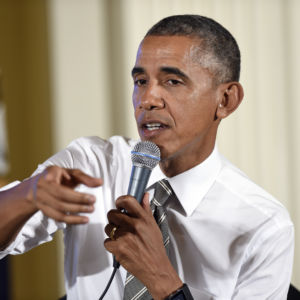In the five days since the terror attack on Paris, the debate over whether the U.S. should accept refugees fleeing the Syrian civil war has exploded into the national consciousness — dominating airwaves and front pages, taking over the 2016 presidential race and pitting the president against dozens of governors.
The House on Thursday plans to vote on legislation introduced this week by Texas Rep. Michael McCaul, chairman of the Homeland Security Committee, and Richard Hudson, R-N.C., that would halt the flow of refugees until background checks are complete and federal officials can verify to Congress the would-be immigrants pose no threat to national security.
The rush-job legislation comes as concerns about terrorists sneaking into the U.S. have soared after revelations several of the Paris attackers may have posed as a refugees to gain entry to the European Union.
Speaker Paul D. Ryan, R-Wisc., speaking in support of the McCaul-Hudson bill on the House floor Wednesday, said, “People understand the plight of those fleeing the Middle East, but they also want basic assurances for the safety of this country.”
“The country is uneasy and unsettled, and they have every right to be,” Ryan said.
A Bloomberg poll released Wednesday showed 53 percent of U.S. adults oppose the administration’s proposed refugee resettlement effort, 28 percent would keep the program as it now exists and 11 percent favor a program that accepts only Syrian Christians — an idea the president has ripped as a betrayal of basic American values.
Senate Majority Leader Mitch McConnell, R-Ky., has also called for a moratorium on resettling Syrian refugees in the U.S. and said he is working with Ryan on the issue.
The president, meanwhile, pushed back forcefully Wednesday against those who have criticized his plan to take in at least 10,000 Syrians, ridiculing Republicans like GOP presidential contenders Jeb Bush and Ted Cruz, who have suggested preferential treatment of Christians in the refugee vetting process.
The president called Republican rhetoric “offensive,” and warned that such comments serve as recruitment fodder for ISIS, the terror group that claimed responsibility for the Paris attacks that left 129 dead last week.
“Apparently they’re scared of widows and orphans coming into the United States of America,” Obama said during a joint appearance Wednesday with the president of the Philippines in Manila. “We are not well served when in response to a terrorist attack we descend into fear and panic,” the president said.
Cruz, responding later in the day, challenged Obama to debate the issue.
“I would encourage you, Mr. President, if you want to insult me, come back and insult me to my face,” the Texas senator said. “Let’s have a debate on Syrian refugees right now … It’s easy to toss a cheap insult when no one can respond.”
But the White House doesn’t just face skepticism from Republican senators and presidential candidates.
At least 31 governors, including New Hampshire Democrat Maggie Hassan, have asked the federal government not to resettle Syrian refugees in their states — though it’s not clear whether the states have any input on where the administrations chooses to send any future immigrants.
On Capitol Hill, members of the president’s own party are raising red flags. West Virginia Sen. Joe Manchin, a Democrat, said in a letter to the president Monday that no Syrians should be admitted unless the administration “can guarantee, with 100 percent assurance, that they are not members, supporters, or sympathizers of the so-called Islamic State of Iraq and Syria (ISIS).”
And California Democrat Dianne Feinstein, a usually reliable Obama ally who has already broken ranks with the president on his controversial comment last week that ISIS was “contained,” seemed to be on the fence as well. “It’s clear to me we must prioritize the safety and security of the American people,” she told the San Fancisco Chronicle Tuesday. “At the same time, we can’t completely abandon innocent Syrian civilians in need.”
The president’s biggest problem may be New York Sen. Charles Schumer. The third-ranked Democrat in the Senate indicated Tuesday he may be willing to back the House proposal calling for a “pause” on the White House plans to bring more refugees into the United States.
Schumer and others in the Senate were briefed on the president’s proposal Wednesday.
Coming out against Obama could be particularly costly for Schumer, who is expected to succeed retiring Minority Leader Harry Reid, D-Nevada, in the next Congress. The New York Democrat has come under fire on the left previously for bucking the White House on the Iran nuclear deal.
Follow @DavidEldridge on Twitter.

